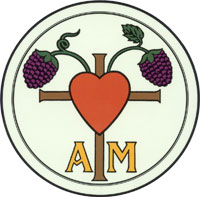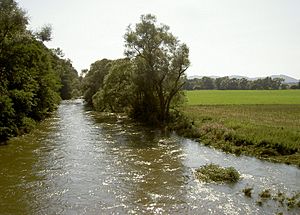Alexander Mack facts for kids
Quick facts for kids Alexander Mack |
|
|---|---|

Mack's personal crest
|
|
| Church | Schwarzenau Brethren (German Baptist) |
| Orders | |
| Ordination | Minister, elder |
| Personal details | |
| Born | 27 July 1679 Schriesheim, Electoral Palatinate in the Holy Roman Empire |
| Died | 19 January 1735 (aged 55) Germantown, Philadelphia, Pennsylvania, United States |
| Buried | Upper Burying Ground, Germantown, Philadelphia, Pennsylvania, United States |
| Nationality | German Palatine |
| Denomination | Anabaptist |
| Residence | Schriesheim, Palatinate; Friesland, Netherlands; and Schwarzenau, Bad Berleburg, Germany and Germantown, Philadelphia, Pennsylvania, United States |
| Parents | Johann Phillip Mack (father) and Christina Fillbrun Mack (mother) |
| Spouse | Anna Margarethe Kling |
| Children | Johann Valentine, Johannes, and Alexander Mack, Jr. (sons) and Christina and unnamed infant (daughters) |
| Occupation | Composer, elder and minister, philanthropist, theologian |
| Profession | Miller |
| Signature | |
Alexander Mack (born around July 27, 1679 – died January 19, 1735) was an important religious leader. He was the first minister of a group called the Schwarzenau Brethren. This group is also known as the German Baptists. They lived in Schwarzenau, a town in modern-day Germany.
Mack started the Brethren group in 1708. He began it with seven other people who believed in a movement called Radical Pietism. Later, Mack and many early Brethren moved to the United States. He continued to lead the Brethren community there until he passed away.
Contents
Who Was Alexander Mack?
Alexander Mack was born in Schriesheim, a region in Germany called the Palatinate. His family worked as millers, grinding grain into flour. He was the third son of Johann Phillip Mack and Christina Fillbrun Mack. He was baptized into the local church on July 27, 1679.
The Mack family stayed in Schriesheim during a time of war called the Nine Years' War. They often had to hide in the hills to stay safe. After finishing his studies, Alexander took over the family mill. He married Anna Margarethe Kling on January 18, 1701.
How Did the Brethren Begin?
Around 1705, Alexander and his wife became interested in the Pietist movement. This movement focused on a deeper, more personal religious experience. They started hosting illegal Bible study and prayer groups at their home.
In the early 1700s, a kind ruler named Count Henrich Albrecht Sayn-Wittgenstein offered a safe place for people who had different religious beliefs. Many of these people, including Mack and his followers, settled near a small village called Schwarzenau. This time of religious freedom was rare back then. Schwarzenau is now part of the town of Bad Berleburg in Germany.
The first group that became known as the Schwarzenau Brethren started as a Bible study. It included Alexander Mack, four other men, and three women. By 1708, they became convinced that people should be baptized as adults, not as babies. This is called Believer's baptism. The group decided to baptize each other. They used a lottery system to choose who would go first. They performed their baptisms in the Eder River. This event marked the official start of the Brethren group.
Moving to the United States
In 1719, some of the Schwarzenau Brethren, led by Peter Becker, moved to Germantown, Pennsylvania, in the United States. They went there to find religious freedom.
Alexander Mack and other Brethren moved to Friesland in the Netherlands in 1720. They left Schwarzenau because of difficulties within the religious community there. However, the Brethren in Friesland faced poverty and struggled to support themselves.
So, in 1729, Mack and about 30 Brethren families sailed to Germantown. Their arrival brought new energy and members to the American Brethren. The community had become less active since their first move. Mack's leadership was very important in keeping this energy alive. When he died in 1735, the community's activity slowed down.
What Did Alexander Mack Teach?
Before the Brethren had strict rules, they believed in several core ideas. These ideas shaped the entire Brethren movement.
- They believed that no one should be forced into religion. This meant they rejected things like infant baptism.
- They saw Christian rites and ordinances as ways to receive God's grace.
- They believed the New Testament was their only guide and rule for faith.
Alexander Mack also believed in Universalism, which means he thought everyone would eventually be saved. He was also a strong pacifist, meaning he believed in peace and was against all forms of violence.
Images for kids
 | May Edward Chinn |
 | Rebecca Cole |
 | Alexa Canady |
 | Dorothy Lavinia Brown |



